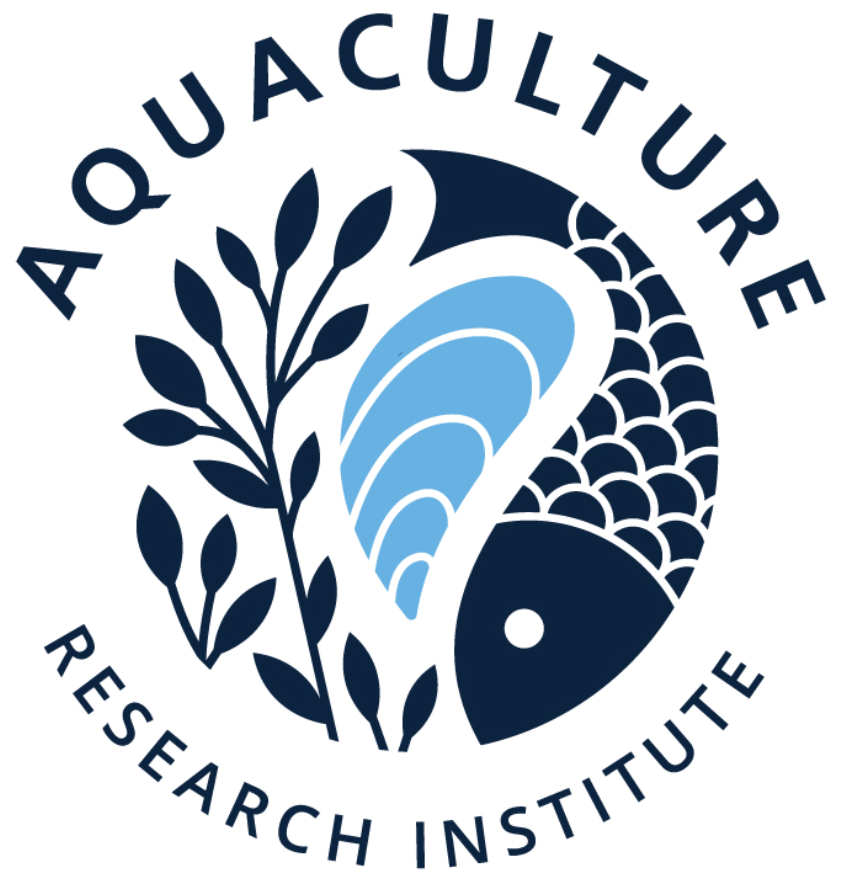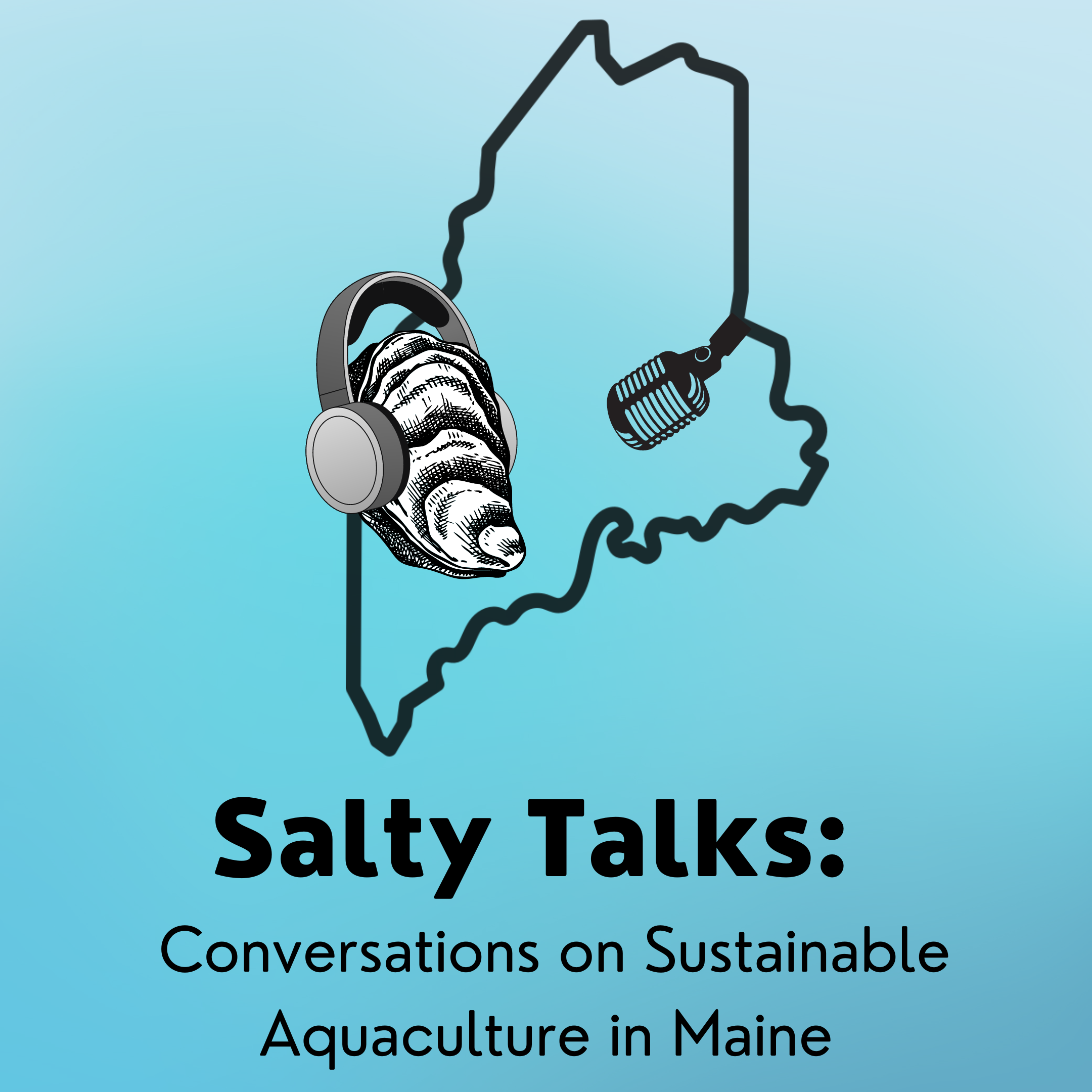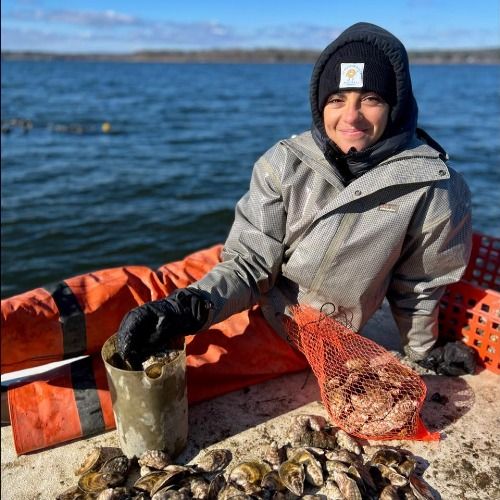The Female Force: The voices of equity and leadership in aquaculture
In this episode, we venture into the world of aquaculture with two trailblazing women who are creating change in the industry. Join us as Amanda and Taja, both Ph.D. students and oyster farmers, share their varied experiences navigating a sector traditionally dominated by men. From finding role models who resonate with their journey to fostering connections with minority groups in the field, these resilient women illustrate the power of the female force in aquaculture. Listen in to gather pearls of wisdom on leadership, equity, and the bright future of a more inclusive aquaculture sector.
Transcript
Amanda and Taja
Corinne
Welcome to another episode of Salty Talks. Today, we delve into a topic that is pivotal in the evolving landscape of aquaculture. Today, I have the pleasure of being joined by two brilliant women who embody the spirit of innovation and resilience in the aquaculture sector. While both of them are pursuing their PhDs, they are also cultivating oysters! I had such a great time talking to these two women about the importance of gender equality in aquaculture. A few months ago I recorded and episode with Libby Davis at lady shuckers discussing the importance of representation in aquaculture and this episode definitely shows this should be an on going topic of conversation.A few months ago I recorded and episode with Libby Davis at lady shuckers discussing the importance of representation in aquaculture and this episode definitely shows this should be an on going topic of conversation.
Amanda
My name is Amanda Moser, and I'm the owner and operator of Lanes Island Shellfish. It's an oyster farm in Casco Bay, about nine acres in size. And I'm also a PhD student at Antioch University.
Taja
And I'm Taja Sims Harper. I'm a PhD student at the University of New Hampshire. I'm also an oyster farmer.
Corinne
Before we dive deeper into the heart of today's discussion, I thought it would be great to set the foundation.. So, I asked each of these remarkable women to share a bit about themselves, their current endeavors, and the initial sparks that ignited their journeys in the marine science and aquaculture field, and also how they met! Let's listen in...
Amanda
Okay, so just generally, I'm studying the distribution of wages, benefits, access and well being in Maine small scale fisheries and aquaculture. As far as farming techniques go. I use some floating culture oyster bags, but primerely. I seed oysters directly on the bottom of the ocean without any gear, and they live there for about two years. And then I go out and hand harvest rake or snorkel to pick them up. So it resembles a natural oyster bed. When I harvest oysters and I'm in the water, I use a fish tote with an inflatable tube around it. Cool. And it looks kind of funny. Like one time when I was fishing right here on New Meadows Lake, someone called and reported me as drowned, dead and totally stop traffic on Route One. And I look up to see ambulances.
Taja
my PhD project is in microplastic pollution. So it's kind of a pilot study that I'm doing down in Great Bay, New Hampshire, where I'm looking at the microplastic quantity in the water throughout Great Bay. Also in oysters, fish species, and green crabs, just to kind of get an idea of what's going on microplastic wise down there. And then I kind of moved it up to Casco Bay. So now I'm looking at 1s microplastics in both wild and farm, just to compare which 1 may have, 4s so well, I've only done one collection, but I think it came out to say that wild populations had about three times more mycoplastics than farmed, and that could be due to several different things. I think the biggest thing is probably age just because we farm them earlier than wild. Sits out there for like five, six, seven plus years and then farmed. We usually collect at like two, three years, so there's a lot less plastic in them.
Taja
Okay, so 1s I studied fisheries ecology as part of my undergrad, and then I studied conservation biology, and I shifted towards aquaculture because that's just the trend end in global seafood production. And the reason I chose to study fish and shellfish, as opposed to some of the more charismatic megafauna, is because they're a primary source of food and protein across the globe. They're super important source of micronutrients, their jobs, their livelihoods, and they're a part of the culture all across the world. So I was originally interested in fish and aquatic ecology, but I'm more interested in people these days. So I went to undergrad at UMaine in Orno, 1s and I really love the ocean. I think that's just why I started. How I got into aquaculture was through a mentor of mine. He was an ecologist who worked with oyster farmers all over Maine. And one summer, he was like I was like, I don't really know what to do. I'm a junior. I'm kind of like, in between, do I do mammals? It's what everyone else is doing, or do I do like because I loved everything. And he brought me around to a couple oyster farms that summer, and I realized how cool it was just to see a problem and like. 1s Kind of be able to fix it in a way. We were looking at blister worms and oyster shells, and the farmers were like, they're kind of ruining our harvest because they're creating these huge mud pockets, and we can't sell the oysters when that happens. And so I was like, oh. So then we started developing an experiment to kind of test how to get rid of the larvae. And I just thought it was super cool because by the end of the summer, where it was like, there was a lot less of the blister in populations. And I was like, oh. So I made change, which I thought was cool, and I was like, and oyster farming seems pretty dope because I don't like being inside in a lab. And I was like, And I can be on the water. I was like, oh, this is cool. And then throughout the years, I started working with minorities in Aquaculture, 1s who introduced me to kelp farming and then introduced me to Amanda, which was great. And then, yeah, I kind of just started 1s learning a lot more about oyster farming and aquaculture, and I was just like, I think this is something I really want to do. So I just started like. 1s Doing it. That's kind of how I fell into Aquaculture here in Maine, 1s women in Aquaculture and Fisheries.
e Nature Conservancy first in:Corinne
To start off our conversation I wanted to know if Amanda and Taja feel there is gender inclusivity within the aquaculture sector or if there is still a road ahead of us. Being immersed in the field both academically and practically, I wanted to know how their experiences may have shaped their viewpoints.
Amanda
No, not at all. Not at all. I guess I developed that perspective from working in different positions along the seafood value chain. So I've worked as an unpaid partner of a fisherman. Then I worked in seafood processing, and then I've worked in research and finally starting my own farm. And I've run my farm for about eight years. Perhaps the climate is starting to change. But when I started my farm and participated in some of the training programs, I was typically the only woman or one of a couple of women, and I didn't really have any role models. 1s That were older than me and looked like me that I could envision myself in their position. So a lot of the people that were presented as leaders and people to aspire to be like were men running large businesses, which is not what I'm doing.
Corinne
Listening to amanda talk, reminded me of when I was in working in fisheries labs - figure that looked like me were few and far between, but occasions when I did encounter role models that I could see myself made all the difference. Figure who echo our ambitions, trajectories, and barriers or struggles are so important in shaping our future and wanted to know if Amanda or Taja had an individuals who helped paint a picture of what could be attainable for them in this field
Amanda
Yeah, I think the irony of that is that there were a few leaders, but for whatever reason, they weren't included in some of the speaking Engage Mint and training program. So I never had the opportunity to meet them or learn from them. Eventually, when I found out about Barb Scully in particular and about her farming methods, I felt so relieved because I was like, oh, somebody else is doing this too. Because the way I was farming was really different from the other models that I was presented with.
Yeah, she was culturing oysters on the bottom. And then I read an article where she had this really cool inner title flip Farm System. It's more relatable.
Taja
Definitely I've always had my story and I could never relate to anyone because it's not just my background in Aquaculture. It's also just, like, my background as a black woman. And so that's hard to convey to people who just don't understand what it's like to grow up in certain households. So it was super nice to talk to someone who literally was just like me, who grew up very similar to me, and it was like, okay. And then this is how they got into Aquaculture. And I was like, okay, that's really similar. I was like, okay, so I'm not weird. I'm not like, an alien. I was like, cool.
Corinne
It’s not just about following a similar path, but sometimes its about seeing someone who shares your background, your struggles, and has navigated the same waters successfully - I see both Amanda and Taja as role models paving a more inclusive path for others coming into the field of aquaculture, serving as some type of representation for those wanting to venture in
Taja
That's what I would like to be, is like a role model for people, I think it's just like building the mindset that I am in a position to be able to do that. So that's kind of where I'm at. It's just like telling myself you are that person, so it's okay to say you are.
Amanda
I guess I actually just share the sentiments you say. I've never thought of myself that way. I think women tend to be more humble and are susceptible to impostor And I guess one thing that I've just really appreciated working with you, but other people like Emily at Emily's Oysters, is that maybe we didn't have the support systems that we needed when we needed them, but 2s I don't know. Through working with you all we've built just done it ourselves, created that supportive community that we always kind of wanted. Yeah. Which is awesome. And then hopefully can provide that to other people. Yeah, exactly. And I think it's starting to happen. Yeah, I think so
Corinne
On the topic of role models and learning form others I turned to Amanda who recently embarked on a journey of knowledge exchange and collaboration down in Mexico to connect with women who have been cultivating oysters for in Puerto Penasco for multiple decades
Amanda
Okay. So I received a travel grant from MAIC. It was a farmer exchange program to travel down to Puerto Penasco, Mexico, and learn from a women's or farming cooperative located in the Gulf of California. And they've been working collaboratively for over 40 years growing oysters, raising children, running a restaurant. They do some ecotourism. I went down with the intention of I guess I was just very curious about how they managed to work together for such an extended period of time. They've been in business as long, if not longer, than any operation in Maine, and they've been very successful at it. So I wanted to learn how they make decisions as group. I was interested to see their farming methods because they're much more similar to mine than. Floating cages. Aquaculture in Maine. And I also just wanted to celebrate and work with women that had hat bulk of experience and see how their work evolved as they aged. So the way this co op is structured is that they're all farming within a single estuary. And it looks a lot like our farm, where everyone's gear is color coded and each person farms a particular section. And I think at peak production, they've grown about 2 million wasters a year. This is in shallow water that drains out at low tide. And they use floating lines, and they actually use something that looks very similar to floating cages that they invented themselves 40 years ago. So Go Deep did not design her floating cages. These women in Mexico have been doing it for a long time, and they made it themselves with what look like the plastic trays that you put soda bottles in to recycle. They stack those on top of each other and then there's a piece of styrofoam. And they simply use ropes. They don't use any sort of shackles. They just tie really thick knots. So the way their coop is structured is that everyone buys their own seed and farms their own oysters. What they share is land and some infrastructure. So they have a restaurant, and each of the families takes the restaurant for a week. They bring in all of the supplies, like plates, cups, water. They have they have no running water, electricity at this location. And they're managing to produce that volume of oysters and running a restaurant that has high traffic flow. So each family keeps the proceeds of the restaurant that week. And then the next week, you pack everything out. Another family packs it in and the families that are run by matriarchs. But it's men and women working together. It's like grandma, grandson, aunts, nephews, everybody. My job was dishwasher. And the cool thing about my trip was they paid me. Like, everyone's work is valued and I knew nothing. And I started on the bottom and they saw that I did a good job washing dishes and paid me. And then the next day, I got to go to the farm. Thinking about farming, but then this whole thing of being this very long standing co op with, like there are a few fishing and sea farming cooperatives in Maine, but cooperatives that I've seen tend to function more in the global south. So cooperatives are definitely a part of the structure, like different communities in Central America and for oyster farming, when you look across the world, women's cooperatives are very common, and everywhere from India to Zanzibar to Mexico, it's a common way for people to work together and share resources. So they've had as many as 100 members. Right now, it's eight solid women that are the head of their families that work together. I asked them what the benefit of cooperating is, and they said, either we cooperate or we have nothing. So I don't know that it's a choice as much as a necessity I really liked the simplicity of the way they set up their floating lines. And I think I can cut out some expenses by mirroring the knots that they use and the way they set up their gear. they face very similar challenges to what I face with my Op operation and other farmers based in Maine. For example, seed shortages, predation storms, coastal development, changes in water quality. That part we had so much more in common.
Corinne
Similar to Anamda, Taja had mentioned earlier about learning and finding connection and community with a group of women, and wanted to hear how her experience with Minorites in Aquaculture, started by Imani Black a few year ago has helped shape her trajectory
Taja
anization that was started in:Corinne
As both Amanda and Taja told me about their experiences in Mexico and with Minorities in aquaculture it seemed sounded with determination both these women sought out connection and communication on their own, which led me to thinking about the broader sector in terms of finding pathways that foster inclusivity. How can we, as a community, work towards cultivating a more gender inclusive field?


